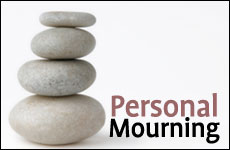 Vampire Weekend's Surprising Jewish Stories
Vampire Weekend's Surprising Jewish Stories


5 min read
After the sudden loss of my father, Tisha B'Av took on new meaning.
Once again, we were sitting on the floor, eating a mourner's meal. Bread, an egg, this time dipped in ashes. Though the whole family was there, there was almost no conversation. This was a meal eaten in solitude, each person for himself, each wrapped in his individual mourning.
This time we were mourning over the Beit Hamikdash, Jerusalem's Holy Temple, destroyed 2,000 years ago.
Two weeks previously, we had also sat on the floor. All together, all alone, an all-encompassing sadness hovering over us. It was hard -- no, impossible -- to comprehend that Daddy was gone. He was so alive, vibrant. Just the day before we had all been laughing together in the kitchen, eating ice cream cones without a care in the world, then rushing to prepare for our family weekend away. And now we were all sitting on the floor, our large family with still-small children, without him.
I found myself wandering aimlessly through the empty house, which remained irrevocably empty no matter how many people came to comfort us, searching for something, someone, no one.
For the first long while, an all-consuming pain lodged somewhere in my chest, sitting there like a solid rock, not budging. I'd never in my life been so intensely aware of anything as I was of that immoveable object. If I wanted to speak, I needed to somehow push the words over and around the boulder of pain; otherwise, there was no way for them to leave my throat. A smile was even more difficult.
So sitting on the floor two weeks after Daddy's death was easy. That's where I wanted to be anyway.
But when you come face-to-face with death, there's no longer any room for pettiness or falsity. Truth takes on a new significance, and I knew that what I was doing now was not an extension of my personal sorrow.
Though I'd eaten this pre-Tisha B'av meal every year since I could remember, that year my understanding of what I was doing went much deeper. The once esoteric laws of the month of Av took on new meaning. I could no longer kvetch about not showering as often as I wanted for the duration of the nine days or not listening to music. After all, during the mourning period for Daddy, I wouldn't even have dreamed of trying to receive a dispensation.
When we mourn a close relative, the laws of mourning have positive effect. The laws force us to live in the present though we might often choose the past. By providing firm structure, the laws help us focus our loss in a constructive manner. But these actions do not represent all that we are feeling. What we're feeling is too deep and too heavy to be manifest in simple actions. The actions are simply an overflow of our internal turmoil.
The pain that lodged in my heart after Daddy's death, that is the pain we should be feeling over our national loss.
When we mourn the Beit Hamikdash, our actions should also be an overflow of our mourning over its destruction and our longing for its rebuilding. We don't turn on the music, not because we can't, but because we don't want to. We sit on the floor and eat our meal of bread dipped in ashes because that is the only place we can sit right now, and that is all we can bring ourselves to swallow. The pain that lodged in my heart after Daddy's death, that is the pain we should be feeling over our national loss.
It's easy to view the nine days as restrictive, focusing on the many things we can't do but wish we could. It would be nice to go swimming, to tackle the laundry pile that is rapidly taking on mountainous proportions, to lighten the atmosphere at home with some lively music. But we can't, so we wait kind of anxiously for the nine days to be over so we can continue with life the way we want to live it.
But perhaps we should view these days not as restrictive, but rather as a once-a-year opportunity that we should grab and hold on to, trying to make the most of this time before it slips away as it inevitably will. When we mourn a loved one, we don't anxiously await the end of the mourning period, for the laws are in sync with our emotions and there's nowhere we would rather be. During the nine days, too, we can deepen our appreciation of our glorious past and of our immense loss. We can try to bring our emotions in sync with the laws, so that the nine days are really where we want to be right now.
When we mourn for people, the act of mourning helps us feel close to our missing loved ones, but it doesn't bring them back. When we truly mourn the Beit Hamikdash, when our loss feels to us deeper and heavier than any personal loss we have ever suffered, perhaps we will finally merit the redemption and rebuilding.
